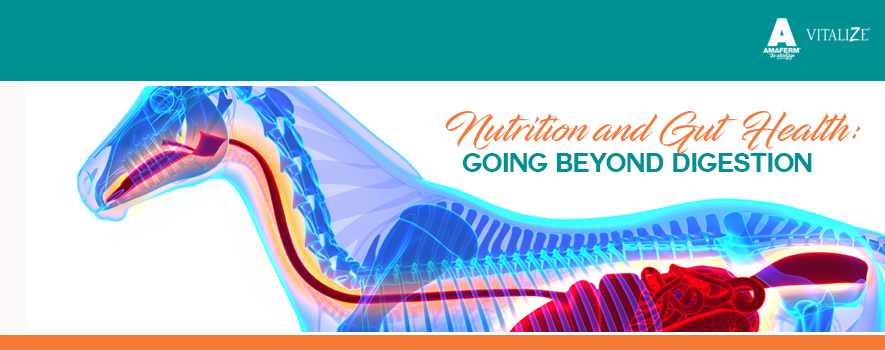
Provided for Carolina Equestrian Magazine by BioZyme®, Inc Lynsey Whitacre, PhD
“All disease begins in the gut.” Hippocrates, the famous historical Greek physician, is known for this short and sweet quote. Is something thought to be so precise over 2,000 years ago still relevant today? And what exactly is gut health?
Gut health refers to the collective viability of the gastrointestinal tract and has an impact on many aspects of overall well-being. The most intuitive, of course, is digestion and absorption of nutrients. The horse’s foregut, composed of the stomach and the small intestine, is primarily responsible for the digestion and absorption of protein, fat and simple carbohydrates like starch and sugar. The digestion of protein, fat and sugar is usually relatively easy for the horse. The digestion of starch and fiber is more difficult because they are more structurally complex. Good gut health is very important to making sure these digestion processes go smoothly. In the foregut, good gut health means maintaining a correct and steady pH, maintaining the integrity of the gut lining and maintaining the activity of the various cells that live there.
The hindgut, composed of the cecum and colon, is primarily responsible for the digestion and absorption of fiber and complex carbohydrates like those found in forage. Within the hindgut the horse has a resident population of microbes (microscopic “bugs”). This population includes hundreds of different types of bacteria, fungi and protozoa, each of which perform unique functions including digesting fiber from forages, breaking down protein, producing B vitamins and supplying the horse with energy. In the hindgut, good gut health means maintaining a stable and correct population of microbes, which helps ensure other aspects of good gut health in the hindgut, like a balanced pH. The difficult digestion of complex carbohydrates depends heavily on microbes, which are able to break down fiber from feeds and forages into a usable form of nutrients for the horse.
Together the hindgut and foregut work to ensure the horse gets the nutrients it needs from the feed. However, the gut has several other functions besides simple digestion and absorption of nutrients. When you think about it, it’s actually quite important since it is the primary barrier between everything an animal ingests and the inside of the body. Its job is to protect the body and selectively allow nutrients to be absorbed, while also protecting the body from other things ingested that could be harmful to the animal. As such, the gut is a very important component of the immune system. In fact, about 70% of all the immune cells in the entire animal are found in the gut!
Keeping the gut healthy allows these immune cells to function properly and efficiently. When the gut is healthy, good microbes flourish and maintain the integrity of the whole immune system from within the digestive tract. The good microbes compete with pathogens for space and food in the gut. When the good significantly outnumber the bad, it becomes easy to eliminate pathogens and prevent digestive upset. However, improving the gut’s immune response isn’t only important for protecting against pathogen and preventing gastrointestinal disease. Several studies have demonstrated that good gut health, and the subsequent efficacy of the gut immune cells, is important for defense against allergies, respiratory diseases, and even cancer.
More recent research portrays an even more interesting function of the gut. If you’ve ever had a “gut feeling”, you may already suspect interaction between the brain and the gut. Interestingly, there is actually a direct physical connection from the gut to the brain called the vagus nerve. The gut and brain also communicate with other another via hormones or neurotransmitters. You may have already heard of serotonin before, a neurotransmitter found in the brain that helps maintain a good mood. Scientists now believe nearly 90% of all serotonin is produced in the gut, making the gut a key player in mood and behavior!
Because of the intimate link between nutrition, gut health, immunity, and behavior, maintaining good gut health is essential to ensuring your horse’s overall well-being. You can help provide good gut health by following these four important tips.
- Give the horse access to ample forage. A horse should consume at least 1% of its body weight each day in forage. This helps keep the hindgut full and the microbes thriving.
- Feed grains in small amounts so they can be digested in the foregut and not fermented in the hindgut.
- Make changes to the diet slowly. The gut and microbes need time to adjust to the change in feedstuffs in order to do their job efficiently.
- Stressors like antibiotics, NSAIDs, hauling, diet changes, or herd changes can interrupt gut health and cause a cascade of negative side effects. During these times, it is especially important to take actions to restore gut health.
As our awareness of gut health grows, so is the number of supplements or feed additives that are available in the equine industry. These supplements are most often based on probiotic or prebiotic ingredients. Probiotics supply the gut with living microbes in an attempt to increase the number of microbes present. Prebiotics, on the other hand, stimulate the growth and activity of the microbes already inhabiting the gut. Vitalize is a brand of products for both horses and dogs that contains Amaferm, a unique and well-researched prebiotic that significantly enhances digestion and absorption of nutrients. The Vitalize line contains products for daily use, including Digest More PLUS and High Performance, as well a Recovery Gel for use during digestive upset, competition, antibiotics, or other stresses. Vitalize products enhance digestion, absorption, and overall gut health to provide a good gut feeling for both horse and rider!

